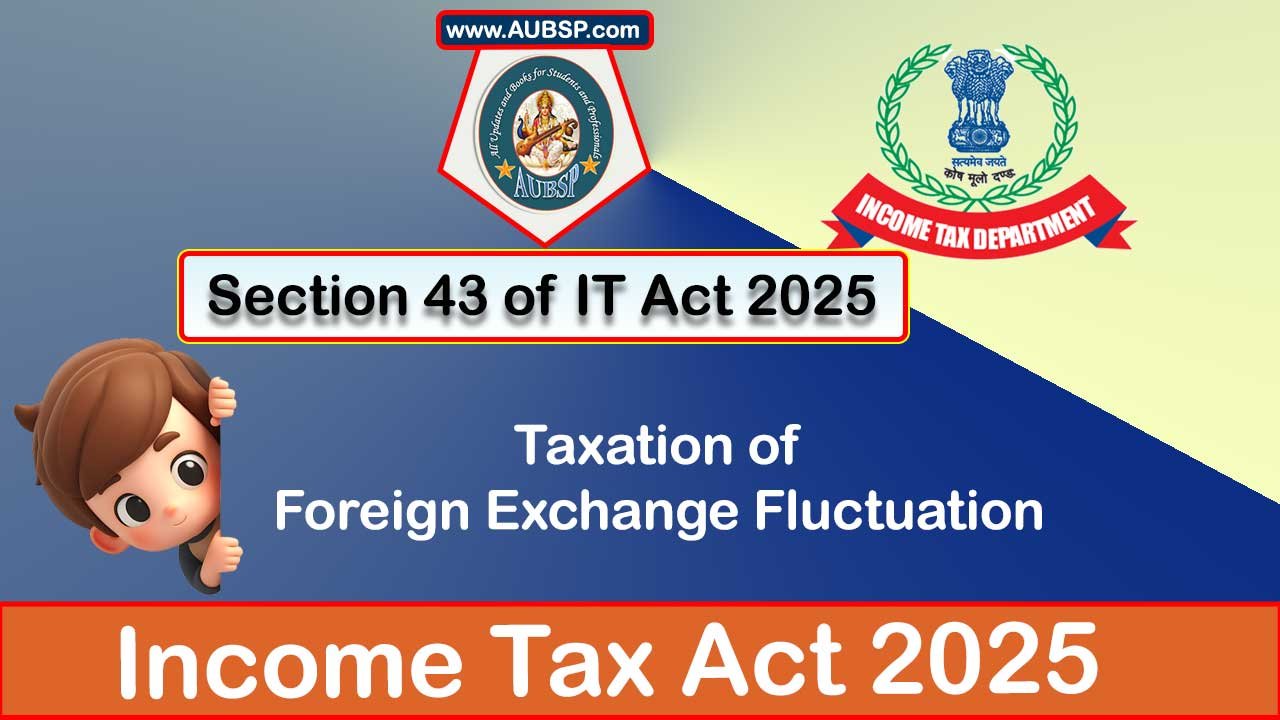Taxation of foreign exchange fluctuation
[As per the Income Tax Act, 2025 (this Act) w.e.f. 1st April, 2026.]
Section 43(1) of Income Tax Act 2025
43(1) Subject to the provisions of section 42 any gain or loss arising on account of change in foreign exchange rates on foreign currency transactions shall be treated as income or loss, and shall be computed as per the income computation and disclosure standards notified under section 276(2).
Section 43(2) of Income Tax Act 2025
43(2) The provisions of sub-section (1) shall be applicable to all foreign currency transactions including—
- (a) monetary items and non-monetary items;
- (b) translation of financial statements of foreign operations;
- (c) forward exchange contracts; and
- (d) foreign currency translation reserves.
FAQs on Section 43 of Income Tax Act 2025
1. What is the primary purpose of Section 43 of the Income Tax Act, 2025?
To tax gains or allow losses arising from changes in foreign exchange rates on foreign currency transactions, subject to Section 42, and computed as per notified Income Computation and Disclosure Standards (ICDS).
2. From when is Section 43 applicable?
It is applicable from 1st April, 2026, as per the Income Tax Act, 2025.
3. What is the scope of Section 43?
It applies to all foreign currency transactions, including monetary items, non-monetary items, foreign operations, forward exchange contracts, and foreign currency translation reserves.
4. How is foreign exchange gain or loss computed under Section 43?
It must be computed as per ICDS notified under Section 276(2) of the Act.
5. Which ICDS standard is relevant for foreign exchange fluctuation?
ICDS-VI (Effects of Changes in Foreign Exchange Rates) governs the computation of such gains or losses.
6. Are both realized and unrealized gains/losses taxable under this section?
Yes, both realized and unrealized foreign exchange fluctuations are accounted for in computation.
7. What is meant by “monetary items” and “non-monetary items”?
- Monetary items include assets/liabilities payable in fixed or determinable amounts (e.g., loans, trade payables).
- Non-monetary items include fixed assets, investments, inventories, etc.
8. Does Section 43 apply to translation of financial statements of foreign branches or subsidiaries?
Yes, translation of foreign operations’ financial statements is explicitly covered under Section 43(2)(b).
9. Are forward exchange contracts covered under this section?
Yes, gain/loss from forward exchange contracts is taxable under Section 43(2)(c), unless covered under Section 42.
10. How does Section 43 relate to Section 42?
Section 43 operates subject to Section 42, which capitalizes exchange fluctuations related to acquisition of capital/business assets.
11. Can a fluctuation be capitalised and taxed at the same time?
No. If a fluctuation is capitalised under Section 42, it cannot be taxed again under Section 43.
12. What is a Foreign Currency Translation Reserve (FCTR)?
FCTR is a reserve that arises when translating the financials of a foreign operation. Fluctuations in this reserve may lead to income or loss under Section 43.
13. Are companies using IFRS or Ind AS also required to follow ICDS for tax purposes?
Yes, ICDS is mandatory for tax computation, regardless of the accounting framework used for financial reporting.
14. Does Section 43 apply to individuals and firms or only to companies?
It applies to all assessees, not just companies, engaged in business or profession involving foreign currency transactions.
15. Can a taxpayer defer the gain or loss due to fluctuation?
No, unless specifically provided under ICDS, gains/losses must be recognized as per prescribed rules in the year they arise.
Section 43 ensures that gains or losses from foreign exchange fluctuations are properly accounted for as business income or loss. It covers a wide range of transactions—including monetary items, forward contracts, and translation of foreign operations—and mandates their treatment as per the Income Computation and Disclosure Standards (ICDS).
However, if such variations are capitalized under Section 42, they are excluded from this provision. This ensures consistency and standardization in tax computation related to foreign currency transactions.

